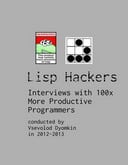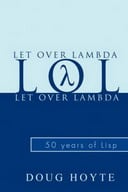Common Lisp学习资源整理
Lisp Hackers: Interviews with 100x More Productive Programmers

Lisp Hackers: Interviews with 100x More Productive Programmers, by Vsevolod Dyomkin, is available for free in multiple formats from Leanpub.
Let Over Lambda

Free online book “Let Over Lambda” is one of the most hardcore computer programming books out there.
Lisp Primer
This text has been written to provide a quick introduction to the basic elements of Common Lisp for both experienced and novice programmers. It is not intended to be a comprehensive account of the language for, in our experience, it takes only a little introduction before most Lisp programmers are able to turn to Guy L. Steele, Jr.’s, Common Lisp: The Language (2nd Edition, Digital Press, 1990) or to the ANSI Common Lisp specifications for all their reference needs.
On Lisp

On Lisp is a comprehensive study of advanced Lisp techniques. It gives the first complete description of macros and macro applications. This book is intended for anyone who wants to become a better Lisp programmer.
Common LISP, Second Edition : The Language

This is the Lisp programmers’ bible. If you need to know the official specification, every function defined in Common Lisp can be found in here somewhere. It is not an introduction to programming in Lisp Common Lisp: The Language only offers the language specification.
Successful Lisp: How to Understand and Use Common Lisp

This free online book is written with the professional programmer in mind. Using a hands on approach it introduces the ANSI Common Lisp standard. Practical examples of working code provide an in depth view of Common Lisp programming paradigms.
Practical Common Lisp

Unlike many other Lisp books, this one doesn’t just touch on a few of Lisp’s greatest features and then leave you on your own to actually use them. It covers all the language features you’ll need to write real programs, and to developing nontrivial software.
Common Lisp: A Gentle Introduction to Symbolic Computation

Free eBook “Common Lisp: A Gentle Introduction to Symbolic Computation” by David S. Touretzky. A highly accessible introduction to LISP, this is for inexperienced programmers and programmers new to LISP. A LISP “toolkit” in each chapter explains how to use Common LISP programming and debugging tools such as DESCRIBE, INSPECT, TRACE and STEP.



